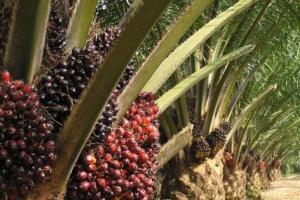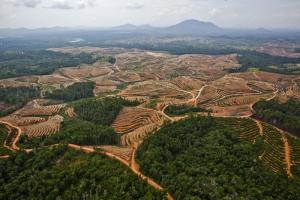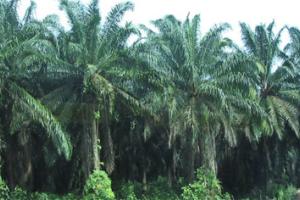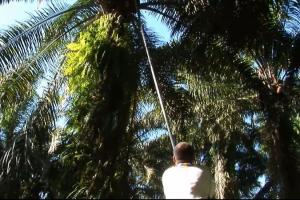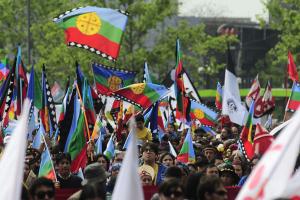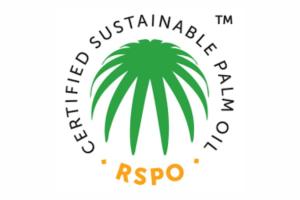On January 29, 2013, at about 4:30pm, a protest of peasants was violently repressed in South Sumatra by the Regional Police. About 25 people were beaten and arrested, peasants and also three activists including Anwar Sadat, Director of WALHI South Sumatra, the main environmental NGO of the country.
Please help release Anwar and the other arrested people by signing the On Line Petition: www.change.org/ReleaseAnwar
Large-Scale Tree Plantations
Industrial tree plantations are large-scale, intensively managed, even-aged monocultures, involving vast areas of fertile land under the control of plantation companies. Management of plantations involves the use of huge amounts of water as well as agrochemicals—which harm humans, and plants and animals in the plantations and surrounding areas.
Other information
30 January 2013
Other information
30 January 2013
Brazil’s Landless Workers Movement (MST) has announced, “We are beginning the year 2013 with several struggles, which represent MST’s response to the irresponsibility of governments. If we do not fight for agrarian reform, which is currently at a standstill, and for the punishment of murderer Adriano Chafik, who killed five landless workers and remains at large eight years later, it would be as if we ourselves were all dead.”
Other information
30 January 2013
Through its Google Group and Facebook page Aldaw will provide periodical updates of news and articles on oil palm development in the Philippines, as well as globally.The bulletin may include information and news on related topics suchas biofuels, bioenergy, industrial agriculture and forestry monocultures. There will be no specific dates for releasing the bulletin which will be circulated as soon as a sufficient amount of information is collated.
Other information
30 January 2013
The documentary video “Bajo Aguán: Cry for the Land” presented in Spanish in Honduras on December 10 during a Human Rights Forum organized by the Committee of Relatives of the Detained and Disappeared (see Bulletin 185), has been launched in the English version. The new video denounces rights violations under the exploitative oil palm plantation model, and can be seen and downloaded athttp://wrm.org.uy/countries/Honduras/Grito_por_la_tierra.html
Other information
30 December 2012
Under the slogan ´Our Future is Now´, more than 150 people – men, women, youth and elderly - from communities inside oil palm concession areas in Liberia gathered between 27 and 29 November in Bopolu City – Gbarpolu County - to discuss the expansion of export-oriented oil palm plantations in Liberia and the impacts of this expansion on their livelihoods. Two big oil palm companies are active in Liberia: the Malaysia-based company Sime Darby with a 311,187 ha concession area, conceded through a 63-years contract with the Liberian government, signed in 2009.
Other information
30 December 2012
On 1st of December 2012, aggrieved landowners from 36 villages in Malen Chiefdom, affected by large-scale oil palm plantations of the Socfin company, sent a letter through their local association (MALOA) to the Human Rights Commission in Sierra Leone, denunciating human rights abuses such as ongoing harassment, molestation and intimidation.
Other information
30 December 2012
Elimination of customary laws through regulations
In 1950, Indonesia’s forests spanned over 162,290,000 hectares, covering 80% of the country’s 192,257,000-hectare land area. According to the 1999 Forestry Law, the forest area owned by the state accounted for 133,876,645.68 hectares.
Other information
30 December 2012
The community-based organization Pangalasag is a member organization of the regional alliance Kalumbay and an organization of Higaonon indigenous people in the municipality of Opol, Misamis Oriental. “Pangalasag”, which means indigenous shield, was created to become a driving force in the resurgence of Higaonon customary laws especially in decision-making and granting of consent, aside from its literal meaning to defend against aggressors.
Other information
30 December 2012
The documentary video “Bajo Aguán: Grito por la Tierra” (Bajo Aguán: Cry for the Land) (1) was presented in Honduras on December 10 during a Human Rights Forum organized by the Committee of Relatives of the Detained and Disappeared in Honduras.
Other information
30 December 2012
Chile is currently debating amendments to Decree Law 701, which was passed during the first years of the military dictatorship and has been used for decades to promote the expansion of large-scale monoculture tree plantations. This expansion is driven by hefty government subsidies, and has been achieved at the expense of the violation of the rights of Mapuche indigenous communities, who have been violently evicted from their lands and left marginalized in their own ancestral territory.
Bulletin articles
30 December 2012
The certifying body Roundtable on Sustainable Palm Oil (RSPO) has failed to act against a company looking for RSPO’s seal which has bulldozed farmland and forests belonging to the indigenous community of Muara Tae, assisted by the intimidation of armed police brought in to protect the company.


